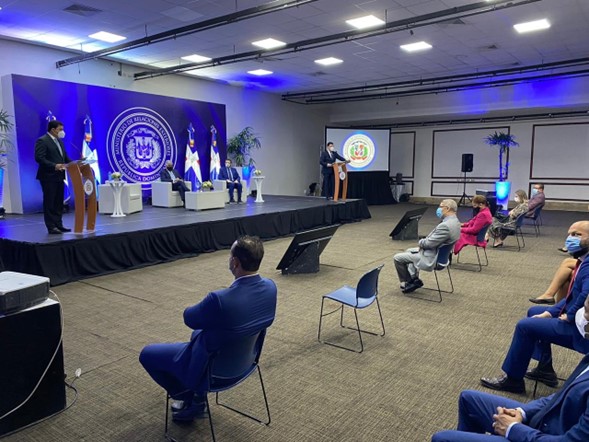100% Online Electronic Apostille and Legalization
Sharing Colombia’s effective e-government system with other countries in the region
Challenges
Before 2012, in Colombia, apostille and legalization procedures needed to be processed in-person at Ministry of Foreign Affairs dependencies, within which the use of physical resources, such as computer equipment, printers, workstations and service modules, were required, and which depended on the availability of trained personnel on specific days and working hours. This was inconvenient to users, incurred high operating costs and expended administrative and infrastructure resources. Moreover, the traditional method led to a greater chance of human error and third-party manipulation of the documents.
To speed up and centralize its systems, strengthen the transparency of its instutions and provide better services to its community, from 2012-2016 Colombia conducted a digital transformation of its apostille and legalization processes. The Department of Information and Technology Management of the Ministry of Foreign Affairs of Colombia locally developed a software to enhance and simplify the apostille and legalization processing methodology. Not only did the new digital procedures reduce expenses but it also improved public national entity interoperability.
Similar challenges with slow and outdated apostille and legalization systems existed in other countries in the region. An efficient way to improve their systems was also needed, and some countries looked to Columbia for support.
Towards a Solution
The 100% Online Electronic Apostille and Legalization initiative, spearheaded by Colombia, offers a technological solution that optimizes the use of technical, human and infrastructure resources. Colombia’s methodology is an integrated technology platform that centralizes everything related to apostille and legalization processes, making the procedure more accessible to a country’s citizens and foreign requesters from anywhere around the world, available 24/7, without mediation. The system increases the reliability of documents, as rather than being physically signed by a third-party, they are digitally inspected, approved and signed via the web page of the country’s overseeing body (e.g., Ministry of Foreign Affairs). This initiative contributes to SDG 9 (industry, innovation and infrastructure) and SDG 16 (peace, justice and solid institutions).
The impact evaluation system consists of a quarterly measurement of non-conforming apostille and legalization products and surveys that measure the level of user satisfaction. A goal of 0.8 percent was established for non-conforming products. In Colombia, the last quarter of 2020 obtained a 0.1 percent non-conforming rate and a 93.7 percent user satisfaction rate (out of a 90 percent target).
Cooperation initiatives to share this innovative technology were conducted between Columbia and the Dominican Republic from 2018 to 2020 and between Colombia and Honduras from 2019 to 2021.
Colombia contributed to strengthening the capacities of the Ministry of Foreign Affairs of the Dominican Republic through the development of the software which was adapted to that country’s specific needs. This resulted in a complete online apostille service for the country. In Honduras, despite the Covid-19 pandemic precluding in-situ visits to examine the infrastructure, essential knowledge and processes were able to be shared virtually with the Honduran Ministry of Foreign Affairs. (At the time of writing, a second phase for the technical visits to Honduras were pending.)
Colombia’s methodology has proven to be sustainable over the long-term as the digitalized apostille and legalization process has been operating effectively since the country’s full achievement of digitalization in 2016. Following installation and implementation of the software, a return to in-person or further mediation has not been required. A further indication of sustainability is that Colombia was recognized by the Permanent Bureau of The Hague for the Apostille Convention as a worldwide pioneer and its model as an innovative practice for the issuance of electronic apostilles using information and communication technologies.
This initiative is replicable as Colombia continues to offer to share its e-apostille expertise to other countries interested in improving their procedures through digitization, via a South-South cooperation model. The recommended project structure is a two-phase implementation: an in-person phase followed by a virtual phase. This allows a progressive implementation of the digital transformation of the procedures. The model can be adapted to any interested country once the minimum economic and technological resources are confirmed to exist. In this regard, it is suggested that interested countries carry out a preliminary study to verify the necessary pre-conditions to proceed.
Contact Information
Fulvia Benavides, Director of Consular Affairs, Immigration and Citizen Service, Ministry of Foreign Affairs of Colombia.
Countries involved
Colombia, Dominican Republic
Nominated By
Colombian Presidential Agency of International Cooperation (APC-Colombia)
Supported By
Department of Information and Technology Management of the Ministry of Foreign Affairs of Colombia
Implementing Entities
Ministry of Foreign Affairs of the Dominican Republic, Ministry of Foreign Affairs of Honduras
Project Status
Completed
Project Period
4/2018 - 7/2020
Sectors
Capacity Building
URL of the practice
www.apccolombia.gov.co/comunicaciones/publicaciones/portafolio-de-oferta-de-cooperacion-sur-sur-de-colombia/apostilla-yPrimary SDG
09 - Industry, Innovation and Infrastructure
Secondary SDGs
16 - Peace and Justice Strong Institutions
Primary SDG Targets
9.bSimilar Solutions









